Diet Changes by Stage of Chronic Kidney Disease
Chronic kidney disease (CKD) is a serious medical condition that can have major impacts on an individual's health and quality of life.
As the stages of CKD progress, diet changes become increasingly important to help manage symptoms and prevent further deterioration.
In this article, we'll explore how diet changes depending on what stage of CKD someone is in.
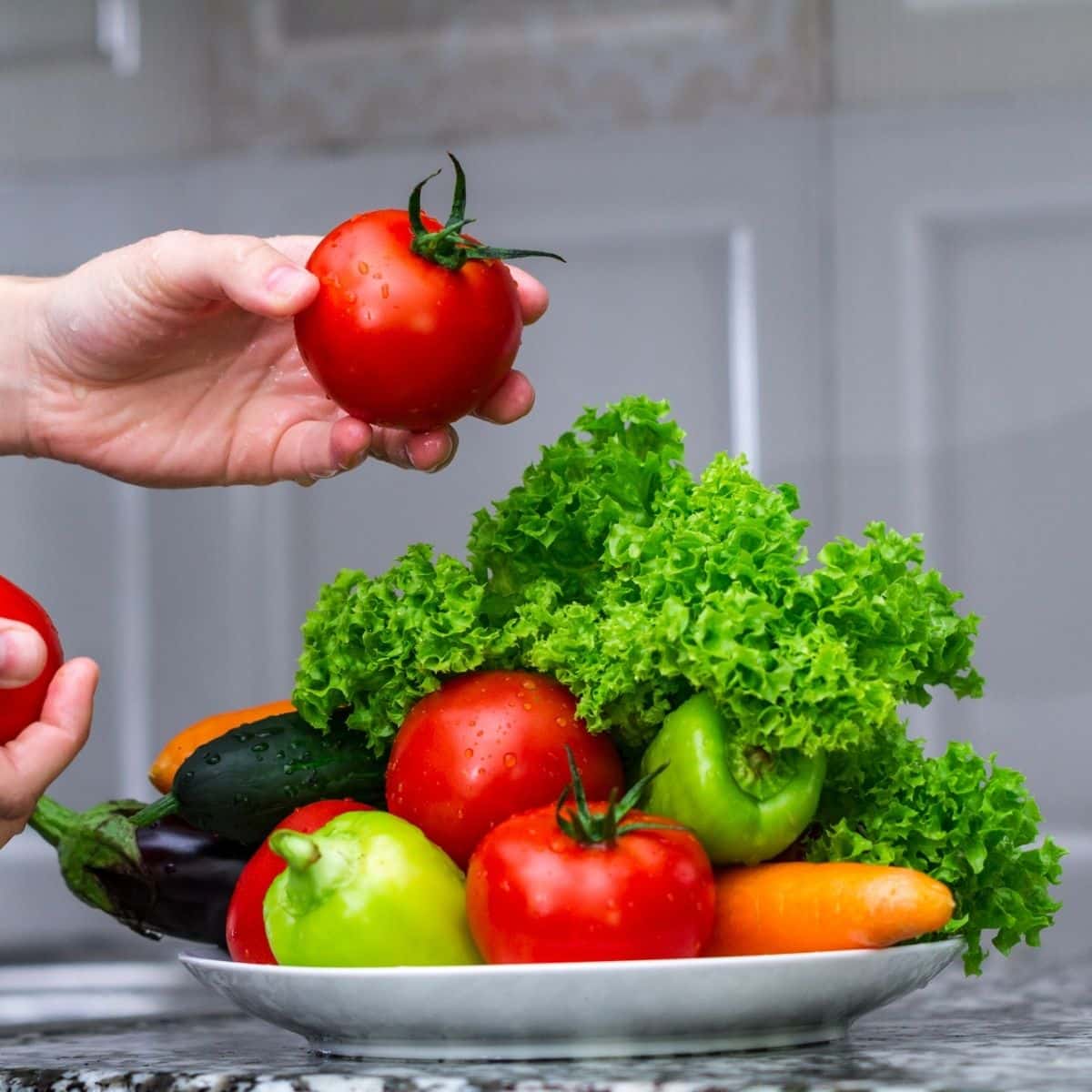
It’s always difficult to hear news about a loved one being diagnosed with such a complex illness like chronic kidney disease (stages of chronic kidney disease).
With so much to take into account when managing the condition, it can be hard for individuals and their families to know where to start.
Understanding what dietary considerations should be taken at each stage of CKD can help those affected make informed decisions about their health care plan going forward. And yes, it's possible to improve my stage of CKD with these tips!
Jump to:
- Overview Of Chronic Kidney Disease
- Nutritional Requirements For CKD Patients
- Stage 1 CKD And Diet Changes
- Stage 2 CKD And Diet Changes
- Stage 3 CKD And Diet Changes
- Stage 4 Chronic Kidney Disease And Diet Changes
- Stage 5 CKD And Diet Changes
- Transitioning To Dialysis
- Dialysis Diet Restrictions Explained
- FAQs for Diet By Stage of CKD
- The Right Diet Can Help At Any Stage of CKD
Overview Of Chronic Kidney Disease
Chronic kidney disease is a condition in which the kidneys are unable to function properly, leading to a variety of health issues. Common symptoms of CKD may range from mild to severe and may include fatigue, difficulty breathing, swelling, and changes in urination. Diagnosis involves tests to check kidney function and often requires a physical examination and a review of medical history.
As with many other chronic illnesses, chronic kidney disease is measured in stages. These stages mark the progression at which the kidneys are losing function.
The stages of kidney disease are determined by a factor known as the glomerular filtration rate, or GFR. Your GFR value is determined by blood tests, specifically your creatinine levels, and other factors. This value is a measurement of your kidney function; therefore it helps to pinpoint which stage of kidney disease you are in.
For More Recipes and Ideas --->> Get Your Free Meals and Recipes That Are Perfect for Pre-Dialysis Diets, Pre-Dialysis with Diabetes, or Dialysis Diets.
Causes
Can kidney disease cause heart problems? Chronic kidney disease is a progressive, irreversible condition that affects the function of the kidneys. It causes severe effects on health and can even lead to organ failure and death if left untreated or unmanaged.
Its causes can include high blood pressure, diabetes, obesity, certain medications, infections, kidney inflammation, glomerulonephritis, and even inherited conditions such as polycystic kidney disease.
To combat this, lifestyle modifications are necessary in order to prevent further damage from occurring. This includes changes in diet, such as avoiding certain foods and managing fluid intake. The food labels should be closely monitored for sodium, potassium, and phosphorus content, as well as fat, and protein levels, because these all affect an individual's ability to manage their CKD effectively.
Furthermore, it is important to avoid processed foods with added sugars and refined carbohydrates which can create more stress on the kidneys. Ultimately, adjusting one's dietary habits not only helps reduce symptoms but also improves overall quality of life for those living with chronic kidney disease.
Symptoms
It’s important to be aware of the symptoms of chronic kidney disease in order to help manage the disease early and prevent further damage. Common signs include fatigue, swelling around the eyes or ankles, nausea, decreased appetite, skin changes such as rashes or discoloration, foamy urine, decreased urination, and confusion. Take the time to know the progression of symptoms for CKD.
Nutritional Requirements For CKD Patients
As soon as you are diagnosed with chronic kidney disease, your doctors are going to recommend dietary changes. Depending on your stage of renal failure, these may be simple changes or very strict restrictions. Fluid restriction guidelines for CKD can be significant as well. This is because what you eat has a huge effect on your kidneys.
Everything you eat, after all, ultimately gets filtered through your kidneys. As your kidneys lose function, it gets harder and harder for them to filter out waste and other excess material. Dietary restrictions are necessary to make it easier for your kidneys to do their job.
Nutrient Balance
Nutrition is an important component of managing chronic kidney disease, and nutrient balance plays a key role in maintaining healthy kidney function. Let's look at how to get the right mix of protein sources, sodium, potassium, phosphorus intake, and calorie for CKD patients.
Protein should come from lean meats like chicken or fish, low-fat dairy products, eggs, legumes and nuts. Sodium intake needs to be limited; however, it can still be found naturally in foods such as vegetables, fruits and whole grains.
Calorie limits depend on age, gender, activity levels and other health factors so consulting with your doctor is essential here. Carbohydrates should mostly be consumed from plant-based sources including quinoa, brown rice and oats (oatmeal and kidney disease). When it comes to potassium intake its best to avoid high amounts of bananas, potatoes and green leafy veggies like spinach or kale.
Protein Intake
Why low protein diet in kidney disease? Protein intake is an important part of the nutritional requirements for people with kidney disease. Eating lean proteins such as chicken, fish, eggs, dairy products and legumes can help provide essential nutrients while also reducing strain on the kidneys.
It's important to know how much protein to consume on a renal diet. In earlier stages of CKD, the recommendation is to consume 0.6-0.8 grams of protein per kilogram of body weight each day for those who are not yet on dialysis (
For patients with end-stage renal disease (ESRD) who are maintained on regular dialysis treatment sessions, 1.0 to 1.2 grams per kilogram per day is ideal to prevent excess catabolism.
Fluid Restrictions
Now that we’ve discussed the importance of protein intake for CKD patients, let’s move on to discussing fluid restrictions. Fluid consumption is an important part of lifestyle modifications (fluid restrictions for dialysis).
Too much liquid can lead to edema or high blood pressure - both of which are common issues in those with kidney disease. It's essential to figure out how much you should drink each day based on what your physician recommends as well as other factors such as activity level, age, and weight.
Reducing salt intake can help lower sodium levels too since salt is known to increase water retention in the body. All these changes will ensure that you're getting enough fluids while still managing your nutritional needs.
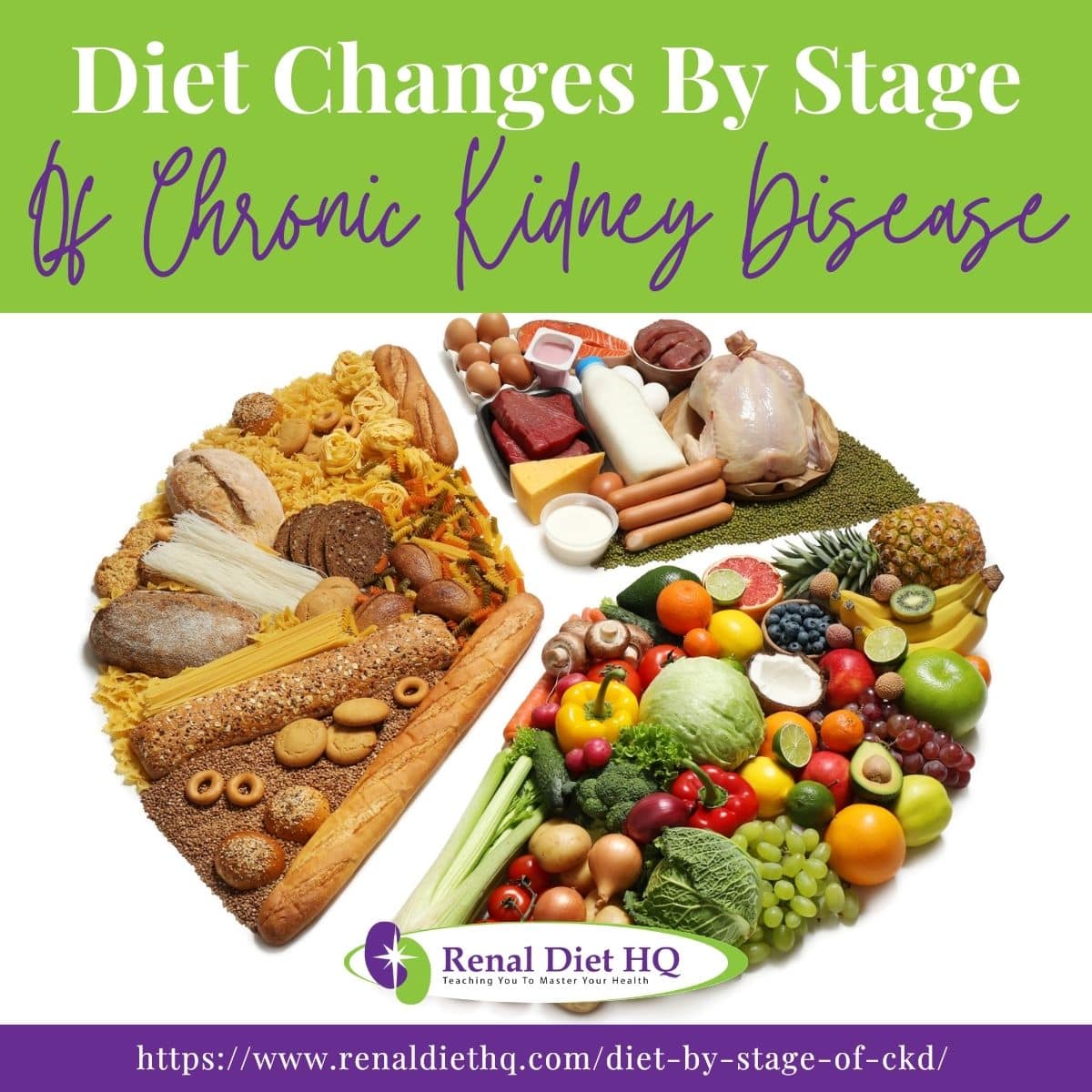
Stage 1 CKD And Diet Changes
Stage 1 CKD is the earliest stage of chronic kidney disease, and is typically asymptomatic. It's important to know the definition of Stage 1 so that you can take the necessary steps to protect your kidneys.
Dietary modifications are key in managing Stage 1 CKD, as certain foods can cause further damage to the kidneys. These modifications include following a healthy diet like the DASH diet, as well as increasing intake of fluids and potassium. It's also important to limit foods high in sugar, as diabetes is a key factor in CKD.
Eating a balanced diet with plenty of fresh fruits and vegetables is essential in managing Stage 1 CKD. With the proper diet and lifestyle modifications, Stage 1 CKD can be managed and progression of the disease can be slowed.
Stage 1 CKD: GFR over 90
Stage 1 of Chronic Kidney Disease with a GFR of over 90 is the earliest stage and can often be managed with lifestyle changes. It's important for those in Stage 1 to focus on preserving their kidney function by monitoring lab values, reducing protein intake, avoiding processed food, and maintaining hydration. These simple steps will help ensure that your kidneys are working as best they can.
Risk factors for developing Stage 1 CKD include diabetes, high blood pressure, certain medications, and family history; prevention includes maintaining healthy lifestyle habits such as staying physically active and eating nutritious foods. You can avoid end stage renal disease by following these options.
Dietary Modifications
Dietary modifications are key in managing Stage 1 CKD, as certain foods can cause further damage to the kidneys. These modifications include reducing sodium, protein, and phosphorus intake, as well as increasing intake of fluids and potassium. It's also important to limit foods high in sugar, as diabetes is a key factor in CKD (foods to eat for CKD Health).
Eating a balanced diet with plenty of fresh fruits and vegetables is essential in managing Stage 1 CKD. With the proper diet and lifestyle modifications, Stage 1 CKD can be managed and progression of the disease can be slowed.
Managing dietary protein has been proven to have a positive effect on slowing CKD progression, so it's essential to reduce intake while still ensuring adequate nutrition levels.
Additionally, staying away from processed foods helps keep blood sugar and cholesterol levels within range; if these numbers get too high, they can damage the kidneys further. Lastly, drinking plenty of fluids throughout the day keeps your body fully hydrated and flushes toxins out more efficiently.
By following a few key diet rules – managing dietary protein, avoiding processed food items, and staying well-hydrated – people in Stage 1 CKD can make significant progress toward achieving better health outcomes.
Stage 2 CKD And Diet Changes
Stage 2 of chronic kidney disease (CKD) is a critical time for care and treatment. It’s when your kidneys begin to fail but you still have some functioning.
Stage 2 CKD: GFR 89-60
At stage 2 CKD, there is mild kidney damage, but the kidneys are still able to work well. Diet changes at this stage can significantly help slow disease progression.
At this stage, you should monitor your blood lab levels, as they will likely need to decrease due to decreased renal function. Additionally, sodium consumption needs to be monitored because too much salt can cause extra fluid retention which can lead to high blood pressure or heart failure.
With careful monitoring by both yourself and healthcare professionals, the right dietary changes at Stage 2 of CKD can go a long way towards improving overall health outcomes. With the right support system in place, you can manage your diet effectively during this crucial period of CKD progression.
Diet Restrictions
Diet restrictions for this stage include limiting sodium, and continuing to eat healthy with plenty of fresh fruits and vegetables (fresh or canned vegetables for a renal diet). It's also important to watch fluid intake and limit the amount of potassium-rich foods. Low sodium diets are key to controlling fluid retention and hypertension.
For nutritional recommendations, it's important to focus on getting enough essential vitamins and minerals while eating a balanced diet. Eating fruits and vegetables, lean meats, and whole grains can help ensure that you get proper nutrition. Increasing fiber intake can also help reduce the risk of further kidney damage.
Stage 3 CKD And Diet Changes
On further progression of kidney disease, the kidney function could decline further. At the third stage of CKD, symptoms caused by the inability of the body to filter waste products and regulate fluids can start showing.
Stage 3 CKD: GFR 59-30
Stage three chronic kidney disease can vary in its severity, but typically patients start noticing symptoms such as fatigue, back pain, leg cramps, fluid retention, and changes in urination patterns.
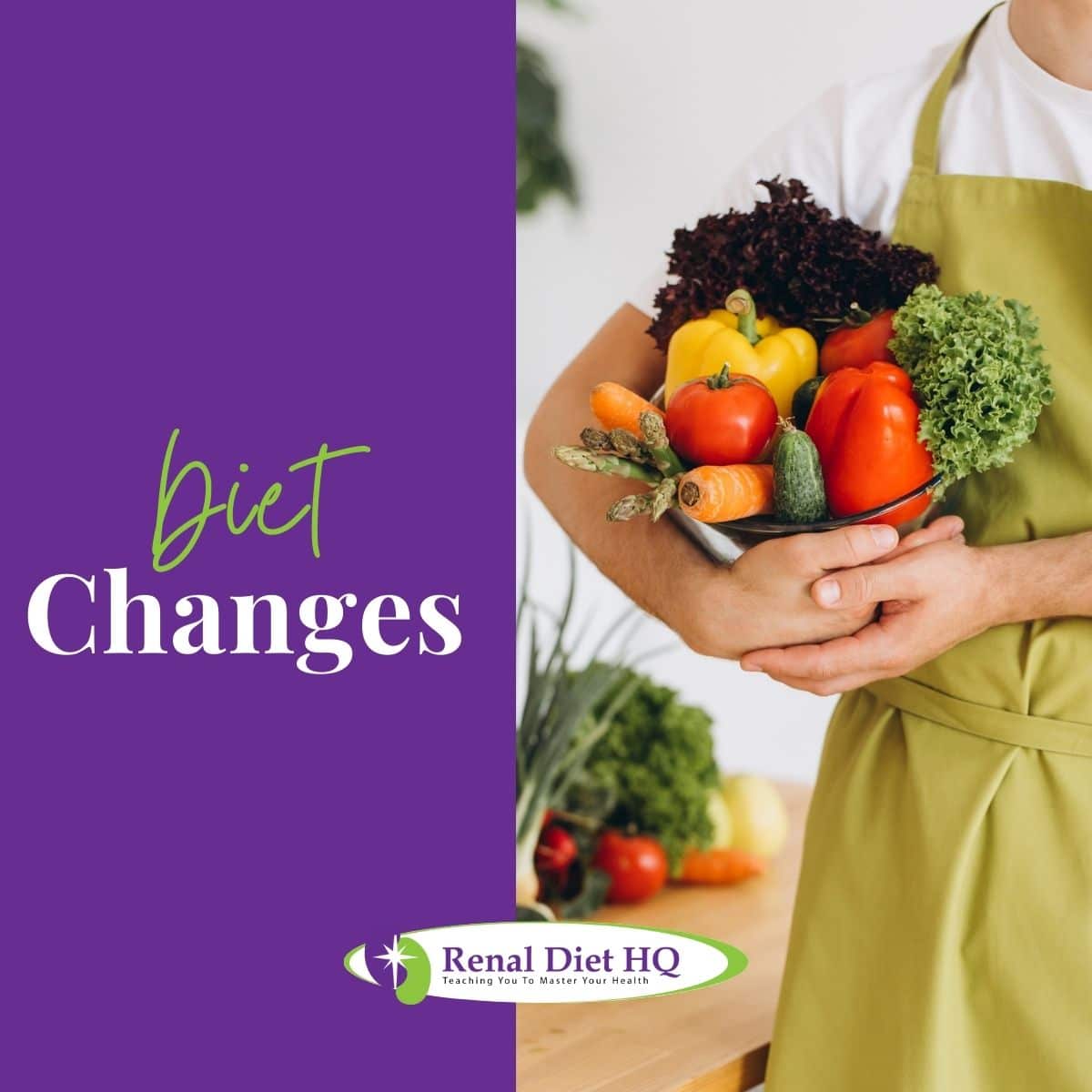
Diet Changes
At this stage of chronic kidney disease, you will likely be referred to a dietitian or nutrition specialist. You will be given a list of recommended foods and restrictions will become necessary to help stop the progression of damage to your kidneys. Specific items to restrict will be sodium, potassium, and phosphorus. As you near stage four, your doctor may limit your protein intake as well.
Portion control for CKD patients is key since having too much intake can put strain on your kidneys. In addition to this, reducing protein intake while increasing sodium intake are also important for managing symptoms like swelling and high blood pressure.
Furthermore, supplementing your diet with vitamins, minerals, and carbohydrates will provide essential nutrients your body needs to stay healthy. Finally, it's always a good idea to check in with a doctor or nutritionist before making any drastic changes so you can get tailored advice based on your individual circumstance.
Stage 4 Chronic Kidney Disease And Diet Changes
At stage 4 chronic kidney disease, the disease has increased in severity and may present with uncomfortable symptoms. Wastes and fluids can start to build up as your kidneys are unable to properly filter your blood anymore.
Stage 4 CKD: GFR 29-15
Stage 4 chronic kidney disease is a serious stage of CKD, and requires a comprehensive approach to lifestyle changes. In addition to the symptoms of stage three, there can be pain, swelling, nausea, vomiting, and nerve problems. Symptoms in stage four of chronic kidney disease can be pretty uncomfortable.
Diet plays an important role in managing this condition, as it can help reduce stress levels and support physical health. Many people living with Stage 4 CKD (stage 4 kidney disease diet) may require emotional support from their family and friends while they adjust to new lifestyle habits. Naturopathic care can also be helpful for providing guidance on how diet modifications can improve overall health during this challenging time.
An exercise program tailored specifically to individual needs will also provide additional benefits to manage symptoms of Stage 4 CKD. Stress management techniques such as deep breathing or yoga may also be beneficial for reducing anxiety associated with making life adjustments due to the condition.
With appropriate care and ongoing support from healthcare professionals and loved ones, individuals living with Stage 4 CKD can make effective dietary changes that will benefit them greatly over time.
Diet Changes
Diet changes are an important part of managing Stage 4 CKD. It's essential to focus on eating nutrient-dense foods such as fruits, vegetables, legumes, nuts and whole grains since they are low in sodium and phosphorus.
Eating a low sodium diet can help reduce high blood pressure commonly experienced by those living with this condition, while a low protein diet helps protect the kidneys from further damage.
To maintain healthy levels of potassium and phosphorus in the body it is also necessary to follow a low potassium and low phosphorus diet respectively - both of which should be monitored closely with regular medical checkups.
On top of a very restrictive diet, your doctor will likely recommend that you start to limit your fluid intake to take more pressure off of your failing kidneys.
Stage 5 CKD And Diet Changes
Stage 5 CKD is the most advanced stage of chronic kidney disease. It's when kidneys are no longer able to function and dialysis or a transplant is necessary. This stage of kidney disease is also referred to as “end stage renal disease”
To manage Stage 5 CKD, diet changes are essential. Patients should reduce their consumption of potassium and protein, as well as limit their sodium and phosphorus intake.
They should also avoid foods high in sugar and saturated fat, as well as alcohol and caffeine. By making these diet changes, patients can improve their overall health and quality of life.
Stage 5 CKD: End Stage, GFR less than 15
Stage 5 CKD is the most serious and advanced stage of chronic kidney disease. It’s the stage when dialysis or kidney transplantation become necessary. Symptoms of this stage include fatigue, nausea, shortness of breath, and swelling.
At this stage, diet changes are essential to maintain a healthy lifestyle while managing an already weakened body.
Fatigue is one of the most common issues those living with this chronic illness experience, it's important to do your best to manage fatigue by incorporating coping strategies such as regular exercise and adequate sleep into your lifestyle changes.
Additionally, emotional support from family or friends can help keep you motivated while dealing with this condition. Lastly, dietary supplements may also be beneficial in providing extra nutrients that cannot be processed correctly due to kidney failure. Taking all these steps will help ensure you live a healthy life despite having Stage 5 CKD.
Diet Changes
Living with Stage 5 CKD can be overwhelming, but making changes to your diet is one way to help manage the condition. Eating low sodium foods and restricting protein intake are two dietary modifications that should be followed closely in order to prevent further damage from occurring.
Fluid restriction and phosphorus control may also need to be maintained as well, while avoiding potassium-rich foods is important too.
While many of your restrictions will remain, your doctor may let off on some of them. This may also be determined by the type of dialysis you choose and how often it is necessary.
To make these lifestyle adjustments easier, it's helpful to consult a registered dietitian who specializes in renal nutrition so they can create an individualized plan for managing your symptoms.
With their professional guidance, you'll have all the tools necessary for achieving better overall health despite living with this chronic illness.
Transitioning To Dialysis
Transitioning to dialysis has dietary changes that come with it. Preparing for dialysis can require a few lifestyle and diet changes prior to the procedure.
Once dialysis is underway, diet changes involve limiting certain foods and drinks, as well as watching sodium, potassium and phosphorus intake. We'll also need to discuss different ways to manage the side effects of dialysis, such as fatigue, loss of appetite and nausea.
Preparing For Dialysis
Starting with a diagnosis of chronic kidney disease may seem daunting, but transitioning to dialysis can be made easier by preparing in advance.
Eating the right food, managing medications and taking care of your mental health are some key steps for getting ready for this new stage in life.
Preparing meals that meet nutritional needs is critical when dealing with CKD, as well as keeping track of fluid intake throughout the day.
Medication management becomes even more important at this stage since many drugs must be carefully monitored or adjusted depending on lab results and other factors.
Exercise habits should also be considered; light exercise such as walking can help keep joints flexible while providing much-needed stress relief during this transition period.
Lastly, it’s important not to neglect one's mental health; talking to a trusted friend or family member about any worries you have will help alleviate anxiety surrounding dialysis treatments. With these tips in mind, making the shift from CKD to dialysis can become an empowering experience!
Diet Changes For Dialysis
When it comes to transitioning to dialysis, diet changes are essential for maintaining good health. Those with kidney failure need to plan their meals carefully and adjust their fluid intake based on the recommendations of a renal dietitian.
Fluid management is especially important since too much can lead to dangerous side effects like headaches or nausea.
As with the other stages of kidney disease, sodium intake as well as phosphorus and potassium levels should be closely watched more than ever.
Due to the effects of dialysis, instead of restricting it, you may need to consume more amounts of protein to avoid malnutrition.
With these, meal planning is an important part of any dialysis transition. With the help of a qualified healthcare professional, creating a dietary plan that works best for you will ensure successful navigation through this new stage in life!
Managing Side Effects Of Dialysis
Dialysis can bring on a variety of side effects, such as fatigue and nausea. Thankfully, there are steps you can take to manage them.
First, reducing your fluid intake may help reduce fatigue; however, this should be done in coordination with your healthcare provider since not drinking enough fluids could lead to dehydration.
Additionally, supplementing your diet with the right nutrients can help combat any deficiencies that dialysis may cause.
Your physician will work closely with you to monitor you should there be any complications during dialysis. But the right dietary approaches can help prevent and ease any symptoms.
Finally, avoiding toxins like alcohol or smoking is key for protecting both your physical and mental health during transition. Managing stress levels is also important for maintaining optimal health throughout dialysis treatments - try relaxation techniques like deep breathing or yoga!
Dialysis Diet Restrictions Explained
Protein and sodium intake are among the most important nutrients that should be watched when you are already maintained on dialysis. These nutrients are important in managing hypertension as well as other symptoms associated with end stage renal disease.
Protein
Protein is an integral part of any renal diet. People with ESRD have to manage their protein intake as dialysis can cause loss of protein through the process itself, as well as some accompanying inflammation.
It's important to understand that in order for your body to benefit from proteins, they need to originate from healthy sources like egg whites, fish, poultry, lean cuts of beef and pork. These foods are also low in fat and sodium which in turn helps maintain good renal functions through improving blood pressure levels.
Eating a variety of these nutritious foods allows people undergoing dialysis or having advanced stages of CKD to get adequate amounts of protein preventing malnutrition or excessive catabolism.
Sodium
Reducing salt is an important part of dialysis diet restrictions, as it can help reduce the risks associated with CKD and hypertension management. It's essential for those undergoing dialysis or having advanced stages of CKD to be aware of their sodium intake from food sources like canned goods, processed meats, and sauces.
Sodium intake must be kept at less than 2000 mg per day. Tracking your daily salt consumption through food labels will ensure you stay within safe limits and benefit from reducing salt in your renal diet.
Also, managing a low-sodium diet will support better health outcomes by helping maintain blood pressure levels and reducing excess fluid retention. You can always do a crash course on how to read labels carefully as a kidney patient.
FAQs for Diet By Stage of CKD
When not properly managed, CKD can lead to complications like anemia, bone disease, hyperparathyroidism, electrolyte abnormalities, nerve problems, and cardiovascular disease.
Hence, it’s important to manage CKD through diet at the earliest stages and always be guided by your nephrologist to best manage your condition
Monitoring your kidney health is critical to leading a healthy life with chronic kidney disease. It's important to keep track of risk factors such as medical history, exercise routine, and fluid consumption (fluid restrictions for dialysis) in order to stay on top of your condition.
There are various ways you can monitor your health; regular monitoring tests, which may include urine or blood tests, help detect any changes that may be occurring in the body.
Additionally, paying close attention to dietary patterns ensures proper nutrition for optimal renal function. Also, keeping an eye on how much water you're consuming helps maintain adequate hydration levels without causing fluid buildup.
Most importantly, always follow the advice of your kidney doctor in terms of monitoring your diet and kidney health overall.
When it comes to preventing Chronic Kidney Disease, there are some lifestyle changes you can make that may help reduce your risk.
Eating a diet low in sodium (low sodium renal diet) and rich with plenty of fruits and vegetables is important for maintaining healthy kidneys. Be sure to stay hydrated by drinking at least 8-10 cups of water throughout the day.
Maintaining a healthy weight and avoiding toxins like alcohol, cigarettes and drugs will also help protect your kidneys from damage. Finally, exercise regularly; this not only helps keep your weight down but has other numerous benefits as well!
Early detection and treatment of chronic kidney disease is essential to slow down its progression. Regular blood tests (egfr blood test), along with dietary modifications such as reducing sodium intake, can help monitor CKD.
Making healthy diet choices and incorporating an exercise plan can make a big difference in managing the severity of CKD symptoms.
Medications prescribed by your physician will also be essential in managing your kidney disease. For those with end stage kidney disease, dialysis or kidney transplant are the most important treatment modalities.
The Right Diet Can Help At Any Stage of CKD
Can diet improve ckd symptoms? It is important to remember that diet plays an important role in managing CKD at any stage. Eating foods low in sodium, potassium, and phosphorus as well as the appropriate amount of fluids helps reduce strain on the kidneys and maintain good overall health.
Taking medications prescribed by your doctor also keeps symptoms from worsening.
Living with chronic kidney disease can be difficult, but by making lifestyle changes and monitoring your health, you can manage this condition. With proper care, CKD does not have to take control of your life.







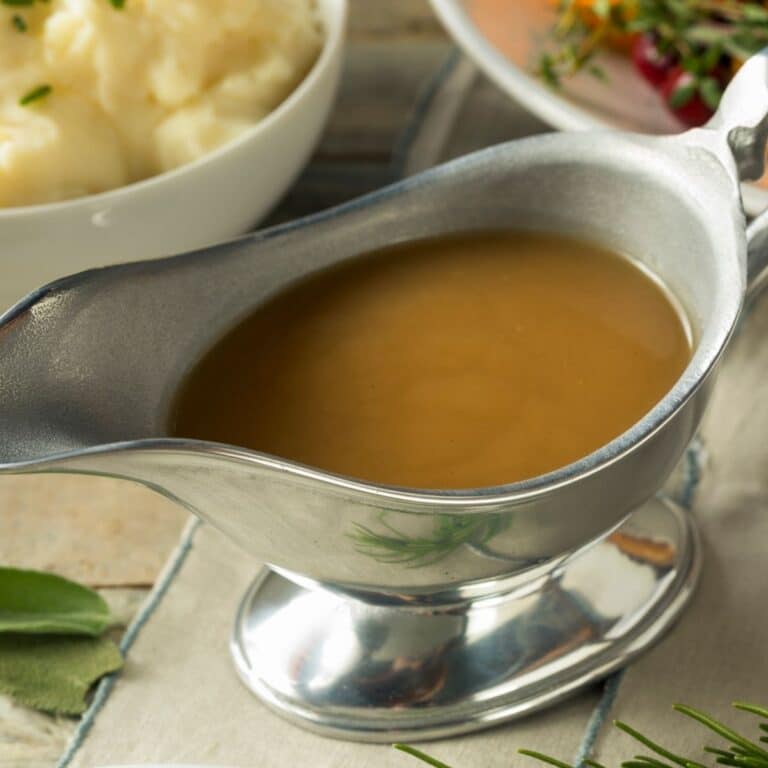


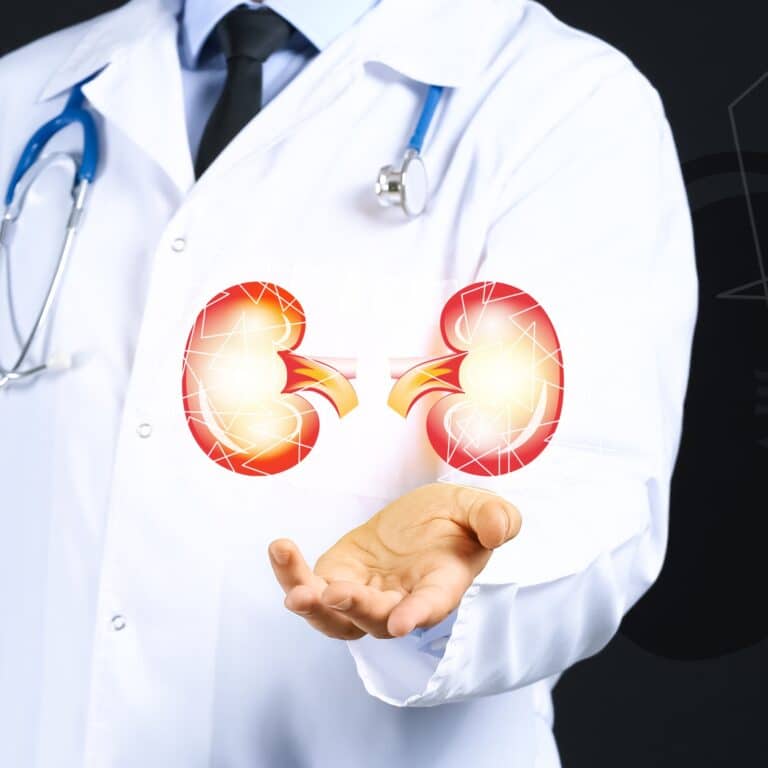





I am stage 3. 41% kidney doctor said need diet for this please
Carolina Marcin
[email protected]